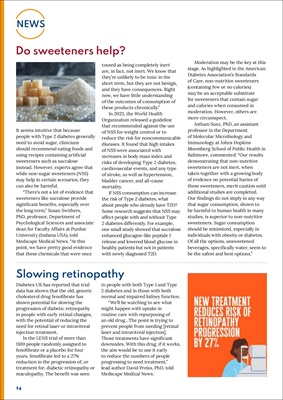
14
NEWS
Do sweeteners help?
Slowing retinopathy
Diabetes UK has reported that trial
data has shown that the old, generic
cholesterol drug fenofibrate has
shown potential for slowing the
progression of diabetic retinopathy
in people with early retinal changes,
with the potential of reducing the
need for retinal laser or intravitreal
injection treatment.
In the LENS trial of more than
1100 people randomly assigned to
fenofibrate or a placebo for four
years, fenofibrate led to a 27%
reduction in the progression of, or
treatment for, diabetic retinopathy or
maculopathy. The benefit was seen
in people with both Type 1 and Type
2 diabetes and in those with both
normal and impaired kidney function.
"We'll be watching to see what
might happen with uptake in
routine care with repurposing of
an old drug…The point is trying to
prevent people from needing [retinal
laser and intravitreal injection].
Those treatments have significant
downsides. With this drug, if it works,
the aim would be to use it early
to reduce the numbers of people
progressing to need treatment,"
lead author David Preiss, PhD, told
Medscape Medical News.
It seems intuitive that because
people with Type 2 diabetes generally
need to avoid sugar, clinicians
should recommend eating foods and
using recipes containing artificial
sweeteners such as sucralose
instead. However, experts agree that
while non-sugar sweeteners (NSS)
may help in certain scenarios, they
can also be harmful.
"There's not a lot of evidence that
sweeteners like sucralose provide
significant benefits, especially over
the long term," Susan Swithers,
PhD, professor, Department of
Psychological Sciences and associate
dean for Faculty Affairs at Purdue
University (Indiana USA), told
Medscape Medical News. "At this
point, we have pretty good evidence
that these chemicals that were once
touted as being completely inert
are, in fact, not inert. We know that
they're unlikely to be toxic in the
short term, but they are not benign,
and they have consequences. Right
now, we have little understanding
of the outcomes of consumption of
these products chronically."
In 2023, the World Health
Organization released a guideline
that recommended against the use
of NSS for weight control or to
reduce the risk for noncommunicable
diseases. It found that high intakes
of NSS were associated with
increases in body mass index and
risks of developing Type 2 diabetes,
cardiovascular events, and any type
of stroke, as well as hypertension,
bladder cancer, and all-cause
mortality.
If NSS consumption can increase
the risk of Type 2 diabetes, what
about people who already have T2D?
Some research suggests that NSS may
affect people with and without Type
2 diabetes differently. For example,
one small study showed that sucralose
enhanced glucagon-like peptide 1
release and lowered blood glucose in
healthy patients but not in patients
with newly diagnosed T2D.
Moderation may be the key at this
stage. As highlighted in the American
Diabetes Association's Standards
of Care, non-nutritive sweeteners
(containing few or no calories)
may be an acceptable substitute
for sweeteners that contain sugar
and calories when consumed in
moderation. However, others are
more circumspect.
Jotham Suez, PhD, an assistant
professor in the Department
of Molecular Microbiology and
Immunology at Johns Hopkins
Bloomberg School of Public Health in
Baltimore, commented: "Our results
demonstrating that non-nutritive
sweeteners are not inert, when
taken together with a growing body
of evidence on potential harms of
these sweeteners, merit caution until
additional studies are completed.
Our findings do not imply in any way
that sugar consumption, shown to
be harmful to human health in many
studies, is superior to non-nutritive
sweeteners. Sugar consumption
should be minimized, especially in
individuals with obesity or diabetes.
Of all the options, unsweetened
beverages, specifically water, seem to
be the safest and best options."
JBS to add image, image
website down at moment